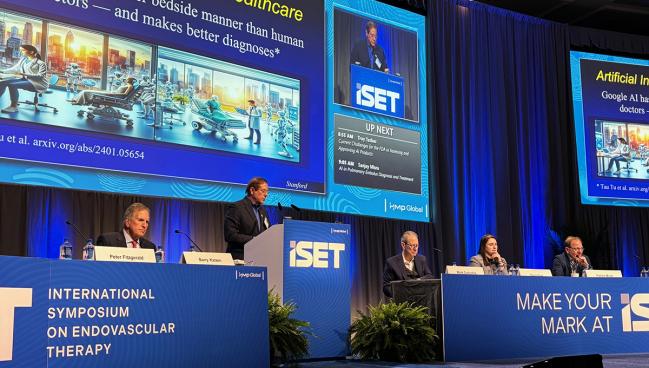AI Tools Can Flourish in CV Medicine, but Clinical Acumen Remains Key
Peter Fitzgerald, in his keynote presentation at ISET 2024, reassured that physicians can’t be replaced by an algorithm.

MIAMI BEACH, FL—Talk about artificial intelligence (AI)’s future in medicine is more than just hype, with the tools offering the potential to not only fine-tune clinical decision-making but also overcome barriers to healthcare delivery, a session today at ISET 2024 made clear.
Physicians aren’t bystanders in the face of such change and are well positioned to explore AI’s full potential, said Peter Fitzgerald, MD, PhD (Stanford University, CA), in his keynote presentation kicking off the meeting. In the ISET Town Hall, this year devoted to “the good, the bad, and the scary” of AI, the audience was rapt.
Just last week, Google researchers released data in the open-source arXiv suggesting that the AI they tested “has better bedside manner than human doctors: it makes a better diagnosis,” Fitzgerald pointed out. “It came out of a journal I'd never heard of, and it was not peer reviewed. So some of these Google guys sit around going, ‘We got it. We got it.’ The problem is they don't understand the ‘we got it’ part in healthcare.
“Good doctors, good healthcare providers know how to do,” he continued. “Better doctors and healthcare providers know when to do. But the best healthcare providers and doctors know when not to do. That's not an endpoint of an algorithm.”
This human element is why it’s important to be balanced when incorporating AI into care, Fitzgerald said. Healthcare is already rich with data, but “the problem is it's disorganized. It's distributed. It's deviant with respect to protocols. It's in silos and it's unstructured, which is not something we're used to or have the talents inside healthcare facilities to decode, much less share,” he observed.
Speaking with TCTMD, Fitzgerald acknowledged there can be reluctance among clinicians to adopt AI tools, feeling they might be foisting something unnecessary onto their patients or might find themselves forced to give up control. He said the power of AI to offer better communication about health metrics is persuasive, though. “I think the docs are very happy with that, as long as there’s an infrastructure and not an overburden” of data, Fitzgerald explained. Wider use will need to involve everyone on the healthcare team, not just the physician. Nurses, he added, thus far have been “much more open to it.”
AI to Engage With Patients
The possibilities for AI in healthcare are endless, Fitzgerald said, drawing a distinction between predictive AI (for predicting what might happen) and generative AI (for creating new content). He suggested that, beyond commonly discussed applications like image interpretation, AI could be used to encourage prevention and address inequities.
We need to be thinking and accumulating information to go upstream and play offense and engage folks before the curve is bent. Peter Fitzgerald
Currently, numerous companies from Walgreens to Walmart, Best Buy, and UnitedHealth, with their experience in connecting with customers as a jumping off point, are using AI to develop better ways to engage with patients.
“One of the issues we all face as healthcare professionals is that the people with MI, CHF, pulmonary embolism, strokes, kidney disease come to us. We are on, basically, defense. They engage us with their problem,” said Fitzgerald. Instead, “we need to be thinking and accumulating information to go upstream and play offense and engage folks before the curve is bent.”
AI-based screening tools can play a role in getting ahead of the game as a cheap way to reach patients in rural and other underserved populations, he added.
That said, “the future of medicine with respect to AI is not straightforward,” Fitzgerald acknowledged. “We have adoption lethargy, we have reimbursement and regulation issues, we have legal and security issues, and we don’t data share very well.”
For Fitzgerald, one constant amid these challenges is that the clinician remains central to the healthcare team.
Mark Coticchia, corporate vice president of Baptist Health Innovations (Miami, FL), a panelist in the session, agreed there has been huge growth in health-system efficiencies, precision care, and other areas thanks to AI. He cautioned, though, that it won’t be an easy transition. To start, he said, there’s a risk of “garbage in, garbage out.”
“We have to properly train the algorithms based upon large amounts of diverse data, and a lot of the artificial intelligence applications . . . are trained on small amounts of homogenous data,” he stressed. “I think they’ll get better, and more accurate and more precise, as we [train them].”
He cited other obstacles, including the difficulty of integrating the new knowledge provided by AI into clinical workflows and the limited bandwidth of hospital system IT departments to handle the data.
“Transformative solutions take time to have an impact,” said Coticchia.
Caitlin E. Cox is Executive Editor of TCTMD and Associate Director, Editorial Content at the Cardiovascular Research Foundation. She produces the…
Read Full BioSources
Fitzgerald P. GenAI and the impact on healthcare. Presented at: ISET 2024. January 23, 2024. Miami Beach, FL.





Comments